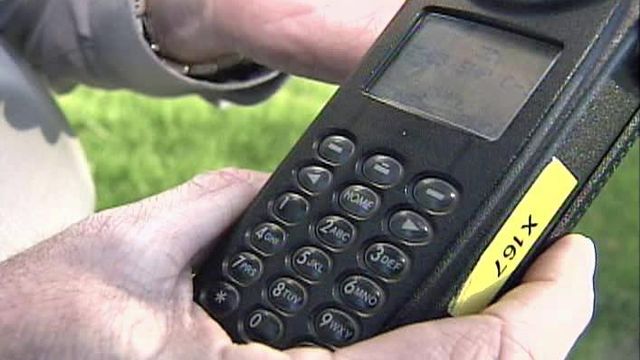Local News
Interagency Radio System Helped Police in Cooper's Capture
A new radio system lets all emergency agencies in an area, including local police, sheriff's deputies and state troopers, talk together when events make that essential.
Posted — UpdatedRALEIGH, N.C. — When Samuel James Cooper was taken into custody after a bank robbery and a chase last week, three law enforcement agencies were in on his capture.
All of the personnel from those agencies knew everything the others were doing thanks to a radio system they call VIPER. The radios allowed law officers to do something this time that they had been unable to do in the past.
It also was something that police, firefighters and emergency medical personnel in New York City could not do on 9/11 – talk to one another by radio.
“All agencies were able to monitor what was taking place inside the building with the search. We could hear the helicopter and what they were seeing from up above,” said Lt. Everett Clendenin, a state Highway Patrol spokesman.
“It was real valuable,” said Garner Police Sgt. Joe Binns.
The bank robbery and Cooper's arrest happened in Garner. Binns said the ability to communicate with other agencies, including Highway Patrol troopers, Wake County Sheriff’s Office deputies and Fuquay-Varina police, at that scene saved time and resources.
“Before, you'd have to find somebody that had a radio that could talk to the person you want to talk to,” Binns explained. “Now, it's just the touch of a button.”
Valuable as it is to emergency personnel on the ground, the nearly $190 million VIPER system has a troubled past when it comes to funding.
State lawmakers denied an $11 million request this year for VIPER transmitters and tower construction. A federal grant ended up covering the costs.
Another debate about money could come in the Legislature. Right now 73 of the state's 100 counties have the capability to implement the VIPER system. It would take another $100 million for the infrastructure for the remaining 27 counties not et on line.
The successful chase and capture of Cooper could help the uncovered counties make a case for funding.
“We believe it made everything safer,” Clendenin said.
State public safety leaders are actively pursuing funding for the system. VIPER stems from the system’s formal name – Voice Interoperability Plan for Emergency Responders. They worry that if it takes too many years to implement VIPER, the technology could be outdated by the time the entire state is covered.
The Highway Patrol has been the lead agency in implementing the VIPER system. Its operation is akin to a cell-phone system, with computers directing signals to the appropriate radio towers based on where radios “tell” the system they are. If needed, a state trooper on the Outer Banks could talk to one in Charlotte by selecting the appropriate channel. VIPER would connect the two through their local towers.
Another example of the system’s utility is large events such as happen in Chapel Hill on Halloween and if the University of North Carolina’s basketball team wins the national collegiate championship. Police from numerous agencies are brought to the town, and the VIPER system allows them to have common radio communications.
• Credits
Copyright 2024 by Capitol Broadcasting Company. All rights reserved. This material may not be published, broadcast, rewritten or redistributed.





